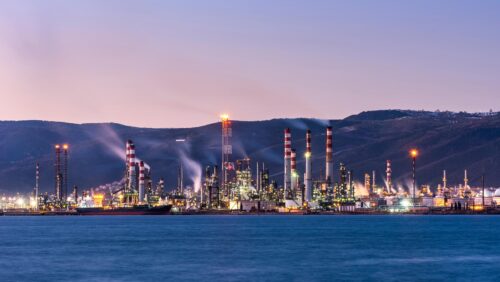Steel Decarbonization Policy Levers
The American steel industry is at a crossroads. Ten key policies can drive it toward a renaissance — fueled by clean energy.
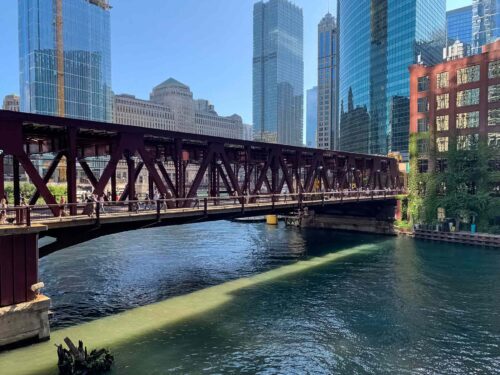
Our world is built with steel. It’s in our cars, skyscrapers, and wind turbines. It’s a resource that we can’t live without and a resource that we can’t afford to keep making in the same way we always have.
Steel has many applications, but it has only two sources: iron ore and recycled scrap. Almost all steel products are a mix of these two inputs, giving products their unique material properties. Increasing the amount of scrap we use, which requires only about 10 percent of the energy needed to produce steel from ore, is an essential path to decreasing the steel sector’s emissions footprint, but there is not enough scrap available to satisfy the world’s demand for steel. So, we also must clean up the way we make new steel from iron ore, which currently accounts for nearly three-quarters of the steel consumed globally.
Ore-based steel is primarily made using coking coal in a centuries-old, highly polluting process. As a consequence of this and other fossil fuel use, the steel industry makes up roughly 11 percent of global GHG emissions, making it the single largest industrial emitter.
Transitioning existing fossil fuel-based steel production facilities and building new ones with near-zero emissions technology is essential to aligning the iron and steel sector with a safer climate future. This work can’t afford to wait — it needs to start this decade.
The steel industry must modernize, or it risks locking in inefficient, resource-intensive technology. Technology roadmaps and transition strategies are showing us the way. We need to maximize recycling rates everywhere to accelerate the growth of scrap-based production, commission near-zero emissions ore-based production technologies like hydrogen direct reduction, and reduce overall demand for steel.
With hundreds of steel plants across the globe collectively producing over 3 gigatons of CO2e yearly, the technology shift will require coordinated and collaborative action across public and private sectors to rapidly decarbonize the industrial commodities our society depends on. At RMI, we are supporting and accelerating that shift toward a more sustainable steel future across geographies.
Revitalizing steel production will yield multiple benefits, including supply chain security, bolstering national trade balances, and enabling re-investment in infrastructure without increased emissions. RMI is accelerating the business case for steel producers to convert or build new low-emissions steel facilities by improving emissions data transparency through RMI’s Climate Intelligence Program, working with industrial hub partners to connect clean hydrogen producers to consumers and connective infrastructure, conducting facility-level transition planning, publishing regional decarbonization roadmaps, and convening industry leaders committed to scaling hydrogen via green iron corridors through the Green Hydrogen Catapult.

As organizations aim to demonstrate progress toward achieving their climate commitments, steel producers are increasingly fielding buyer requests for product-level emissions data. To address this need, the The Supply Chain Emissions Initiative at RMI is working to enhance emissions transparency and comparability throughout industrial supply chains by publishing steel emissions reporting guidance, emissions reporting tools, and has conducted pilots between corporate buyers and suppliers that apply guidance and tools in real-world scenarios, helping refine emissions calculation, enhance data exchange, and explore ways for data to drive industry decarbonization.

RMI is taking a systems-level approach to advancing the business case for near-zero emissions steel by working across the value chain to identify transition pathways. To align the steel industry with a safer climate outcome, we evaluate low-emissions steelmaking production alongside implications of peak demand, analyze financial and non-financial industry solutions to accelerate and realize an investment decision for domestic near-zero emissions steelmaking projects and, through our work with the Mission Possible Partnership, publish Sector Transition Strategies to create a shared vision and action plan for industrial decarbonization in seven hard-to-abate sectors.

China produces and consumes more than half of the world’s steel, which accounts for about 17 percent of the country’s carbon emissions. To advance decarbonization in this critical market, RMI analyzes the transition path of China’s steel industry under the carbon neutrality goal and compares the characteristics of clean hydrogen steelmaking policies in China and Europe to provide policy recommendations for promoting clean hydrogen-based steelmaking. To support corporate actions, we initiated the Performance-Target-Action-Management (PTAM) framework to assess carbon targets and highlight best practices for future actions. Elsewhere in India, where the emissions of the steel sector are expected to grow by 200 percent by 2050, RMI proposes a roadmap for realizing a low-carbon steel economy.

The future of steel production could enter a new era where iron and steel making are disaggregated, creating Green Iron Corridors. Traditionally, iron and steelmaking processes are located together near access to fossil resources, and steel supply chains are dependent on the regions that supply iron ore. When iron ore reserves are co-located with renewables, a higher value iron product can be produced via green hydrogen and exported. To meet demand and decrease emissions, RMI, through the Green Hydrogen Catapult, is exploring the feasibility of green iron corridors connecting key iron ore producing geographies to iron ore importers with advanced steelmaking capacity.
Demand for low-emissions steel is estimated to increase to 6.7 megatons a year by the end of this decade. Meeting consumer demand for low-emissions steel is critical to decarbonizing the sector. As corporations strive to meet their climate goals, RMI is increasing transparency around product emissions, publishing recommendations on reducing embodied carbon, and facilitating first-of-its-kind procurement deals through demand aggregation.
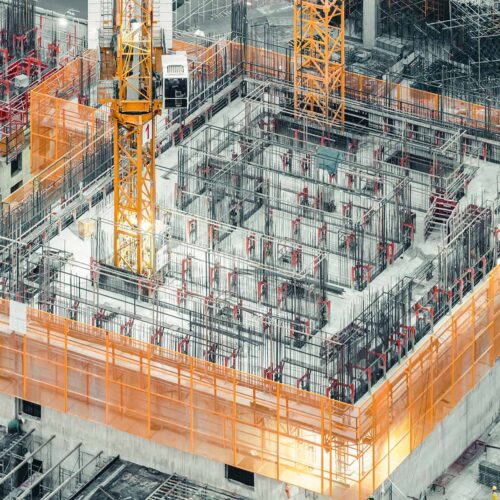
RMI launched the Sustainable Steel Buyers Platform (SSBP) to connect committed companies around the United States that need low-emissions steel to sustainable steelmakers. The Platform is providing steelmakers with the demand signal needed to make critical investments in the domestic steel industry while aiding members in meeting their corporate sustainability goals. By aggregating demand, the SSBP is enabling leading buyers to establish offtakes from the first near-zero emissions steel in North America.

Buildings emit at least 39 percent of energy-related global carbon annually. One-quarter of these emissions result from embodied carbon, the greenhouse gas emissions associated with manufacturing, transportation, installation, maintenance, and disposal of building materials. RMI's Carbon-Free Buildings Program publishes resources to support the development of economical pathways to reduce embodied carbon emissions in the built environment. Through the Embodied Carbon Initiative’s work, we focus on steel decarbonization by highlighting green public procurement policies and low embodied carbon building codes, as well as educating real estate professionals on the business case for addressing embodied carbon. RMI also supports policymakers and industry efforts to improve steel Environmental Product Declarations (EPDs) for producers and streamline low-carbon materials procurement.
Achieving a net-zero steel sector by 2050 will require large-scale action by the financial sector — and we are already seeing financial institutions stepping up to fund decarbonization solutions. RMI is engaging the finance industry through the Center for Climate Aligned Finance, which provides financial institutions with sector-specific guidance to independently measure and disclose the climate alignment of their steel lending portfolios as well as the critical information needed to understand how to scale green steel projects.
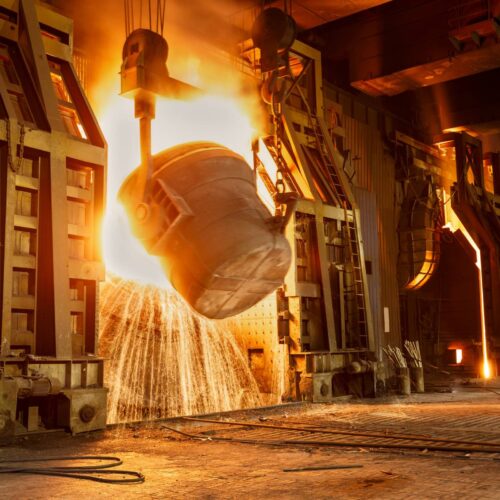
Under RMI’s leadership, six top lenders to the global steel sector — Citi, Crédit Agricole CIB, ING, Société Générale, Standard Chartered, and UniCredit — signed the Sustainable STEEL Principles (SSP), the first Climate-Aligned Finance agreement for lenders to the steel industry. The SSP are a set of commitments designed for banks to adopt a common measurement and disclosure framework, informing them of how emissions-intensive their steel loans are relative to the net-zero pathway needed to stay within our planet’s remaining carbon budget. The SSP’s first annual report details positive steps toward low-carbon steel production, current sector misalignment, and how banks are leveraging insights from applying the Principles to pursue their industrial decarbonization goals.
RMI is creating an enabling policy framework to scale the energy transition by pursuing steel decarbonization solutions at every level of government. We offer a comprehensive framework for state agencies and policymakers to reach net-zero embodied carbon emissions from public building projects, advocate for federal Buy Clean standards to be designed to lower emissions without driving domestic steel manufacturing out of business, and make policy recommendations to accelerate decarbonization in some of the largest steel producing economies in the world.
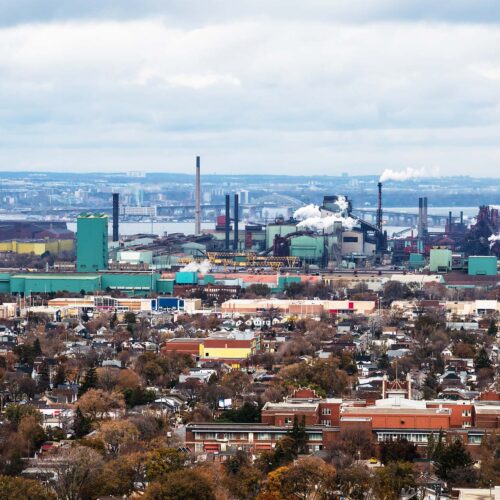
RMI’s Accelerating Clean Regional Economies (ACRE) initiative works with economic development organizations, policymakers, business, labor, and community stakeholders to advance clean manufacturing and industries. The Great Lakes region presents an immense transition opportunity, where we’ve published state-specific memos outlining pathways for policymakers and other state-level actors to support near-zero emissions steel production. To help cities and federal governments reduce embodied carbon, RMI created the Embodied Carbon Cities Policy Toolkit as well as a roadmap to establish policy pathways for federal building projects to achieve zero embodied carbon by 2050.
Supporting climate tech entrepreneurs is integral to accelerating a low-emissions future, particularly when it comes to a primary commodity like steel. Faced with the rising urgency of the climate crisis, RMI and New Energy Nexus launched Third Derivative (D3), which takes a systems approach to building the ecosystem needed for climate technology innovation to succeed.

RMI’s Third Derivative program, a global, vertically integrated startup accelerator unites startups, investors, corporates, and market and policy experts to work together to accelerate the rate of climate innovation. Through three Industrial Innovation Cohorts, including one focused on iron and steel, we find, fund, and support promising industry decarbonization startups through an 18-month accelerator program, partnering with corporate actors to explore opportunities for deployment and commercialization.
The American steel industry is at a crossroads. Ten key policies can drive it toward a renaissance — fueled by clean energy.
As new energy technologies rapidly decrease in cost and improve in quality, regions across the world are scrambling to develop projects that can deliver high-quality jobs and sustained economic development.
In a big year for climate action, 2022 saw the United States double down on strategies and mechanisms to accelerate its economy toward achieving net zero.
Post-consumer recycling needs to increase significantly by 2050, better disclosures can speed up that process.
Buy Clean Standards must be designed correctly to lower emissions without driving domestic steel manufacturing out of business.
A green steel roadmap exploring growth pathways, highlighting barriers and opportunities, and carving out an action plan for transition in India.
The Case of Heavy Industry
Steel Market Update
Financial Times
Ohio Capital Journal
Wall Street Journal
